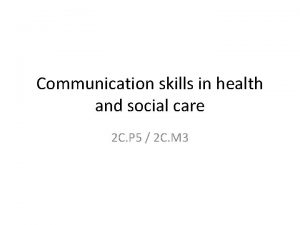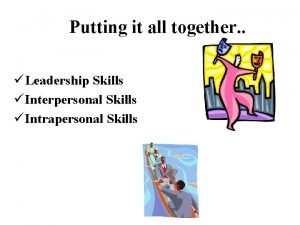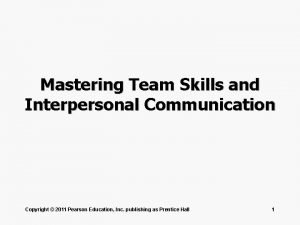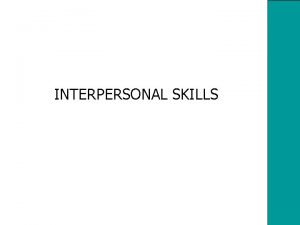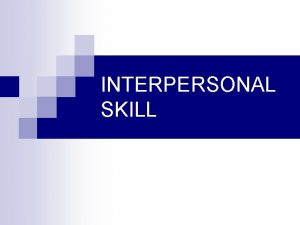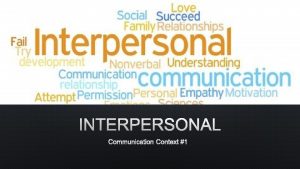Interpersonal skills Necessary Interpersonal Skills Social Care In












- Slides: 12

Interpersonal skills Necessary Interpersonal Skills Social Care

In addition to the Social Work specific skills needed to undertake the job , there are interpersonal skills that Social Workers need to master for several reasons. Social workers work with populations which most people do not want to work with. Service users come with a variety of issues that are difficult to verbalize. Third, social workers are considered the experts. Social Work is a skilled profession and they need to conduct themselves as such. Without, professionalism, achieved through strong interpersonal and career specific skills, social workers lose the hard earned respect of our partners and peers. The following is just a basic outline of the interpersonal skills that social workers need in order to work effectively with the clientele and represent themselves as experts in the field. Social Work specific skills needed

Written Communication– it is crucial for Social Workers to be able to write for a variety of audiences. They need to be able to express expertise to managers, supervisors, court systems and clients to name a few. As a rule, when writing documents to which clients will have access, social care workers need to make sure to use as little jargon as possible. Where jargon is needed, it has to be ensured that this is explained as simply as possible so that communication is kept open and honest. It is important in written communication, especially formal reports and those for court, to spell properly and be grammatically correct. The use of words is a skill. It is imperative that what is written is easily understood. It is time consuming but make sure that everything is proof read. Many social workers used relaxed speech, especially when working with children and young people; this should not be reflected in written documents unless you’re using a direct quote. Written Communication

Verbal Communication – Sometime swhat you say is less important than how you say it. When speaking/having conversations social care workers should always consider their audience. They need to opt for a sympathetic ear because it allows a bit of distance. It gives the client a chance to off load and a chance for the social worker to gather information he/she may not have been able to get if I they were more formal. Try to remember that conversation is dynamic and multi-dimensional. In conversation, there is ; what you say, what the other person hears and how this is then interpreted through the lens of their previous experience. By the time they process it, it may be an entirely different animal than you intended it to be. A big part of this is knowing your clients, having read previous files before meeting with them. You never know what the relationship was like in practice – maybe the previous worker triggered something in the client, maybe the previous worker reminded the client too much of someone in their lives with whom they have a difficult relationship, maybe their relationship mirrors other failed or difficult relationships. Social workers cannot discount the information from the file/previous workers but need to always look at a new working relationship as a “do-over” for clients, a new start. Verbal Communication

Non-verbal skills – it is important to be aware of your body language, the faces you make, the sounds you make and how you make eye contact. Body language is run through both cultural and ethnic lenses and a seemingly innocuous action may mean something entirely different and possibly disrespectful to someone else. Sometimes we unconsciously make faces when we hear something unexpected or something we don’t necessarily believe. It is important as a Social Worker that you learn to “school” your features, that is, you learn how not to let what you are thinking show on your face. Non-verbal communication can make or break a working relationship. If someone were to tell you about, smearing (covering walls and other surfaces with faeces) for example and you make a face as though you can smell it and are disgusted, your client may shut down. It may be a practice with which they are disgusted but unable to change and making a face reinforces the shame and guilt they may already be feeling. Non-verbal skills

Listening – This is “our bread and butter” as they say. Listening, in any Social Work setting, is how we gather information. It is not only important to listen and hear what the person is saying but you have to show you are actively engaged in conversation in order for it to be substantive. People like to see that you are engaged with them. Nodding, making affirmative sounds, making eye contact, asking for clarification, sitting at a respective distance, facing a person while they are talking are all ways to show that you are actively listening. There are those times when you need to write things down, either for your own memory or while assisting with an application etc. In these instances there is nothing wrong with saying to someone you are going to write things down and why, or, going so far as to ask if they mind if you do this. In some settings taking notes while someone is talking can be too distracting to the process. It might be better to allocate time for you to take notes following a meeting or session with a client. Listening

Problem Solving – There are many occasions when we get to know our clients in the midst of a crisis. It is important that you identify what the crisis is and address it. If you are working in a long term team you will need to get this addressed so that you can get started on the plan for the family. Problem solving is much like care planning only in the short term. It is about identifying the problem, breaking it down into smaller tasks and allocating these, then coming back to the table to make sure that everyone has completed their individual tasks so the problem is addressed. If the problem is something bigger, like a housing issue etc. it may be that this needs to be added to the care plan as a longer term task so it is not forgotten. In Social Work, social workers need to “think on their feet” they need to be able to think through problems quite quickly, sometimes coming up with bridging responses until we are in a place to deal with the issue in totality. Social care workers need to be able to address minor issues quickly so it does not overwhelm the longer piece of work that they need to undertake with a client or client system. Problem Solving

Negotiation – A great skill to have personally and professionally. Professionally it is always helpful if you and your client are working together towards a common goal. Too many times our clientele are involuntary, which means they may not agree with what you think the problem is but they still need to work with you. If you are able to negotiate time where you address the need identified as well as those things they see as a problem you get further in the working relationship. You are communicating to them that while your work is important you are also concerned about their concerns and want them to be empowered to change their circumstances. Negotiation is also important in identifying those things you and your client will be working on for the duration of your working relationship. When you get to the management level you will have to negotiate with your subordinates at times to ensure the work gets done when you need it and there are competing priorities. Negotiation

Decision making – Decision making is about using the information you have to come up with a plan to move forward. This is a big part of management. As a manager you go on the information provided to you by Social Workers in order to provide case oversight and direction. For this to work and work properly, the information needs to be as thorough as possible and it needs to be accurate. Making decisions on bits and pieces of information without having a view of the bigger picture is dangerous and professionally unsound. As a Social Worker is it necessary to gather and corroborate as much information as possible as part of your assessment in order to put the appropriate interventions into place. Without precise and detailed information it is quite possible to put in interventions that do nothing to address the actual issue at hand. For instance, if you don’t know that a father is drinking because he is not working and you address the drinking but not the unemployment, there is a risk that he will replace the alcohol with something else to address the feelings that being unemployed bring up for him. Honest and transparent working with clients means that at times they can be part of this process, they can help make decisions about how their issues are addressed, this can empower them and help make them feel part of the process and not just that they are being acted upon. Decision making

Assertiveness – (Communicating our values, ideas, beliefs, opinions, needs and wants freely. ) Being an assertive Social Worker means being clear about your role as a Social Worker, what you are and are not capable of doing, what is and isn’t within your remit, what the consequences are for not engaging and the sequence of events that may trigger the next level of intervention (i. e. – court, referrals, ect. ). It is essential that you are clear with clients and professionals alike from the outset as to why we are involved and what we can, realistically, achieve. It’s about sharing the work around not feeling as though you need to do it all. Professionals and clients alike are quite happy to tell you when you are overstepping their boundaries or trying to extend theirselves beyond their remit, so it is crucial that you are just as clear with them when it comes to the work. It is also about being clear about the authority. It is possible to do this without portraying yourself as a strictly punitive body. Social workers do have the law behind them in most things they do and people know that. If you explain what is possible from the outset, although it may still arise, at least you know within yourself that you have done all you can to keep clients and professionals aware of what you are able to do and what you are not. Assertiveness

For example, it involves many discrete areas of ability such as being alert to professional standards and conduct, or being proactive in one’s own development. These abilities are also needed for successful communication, managing risk and safeguarding. Similarly, being a proficient communicator involves skills and techniques that form the heart of effective leadership and safeguarding. Selfmanagement Professionalism - like the lettering that runs through a stick of rock - can be present in all aspects of routine, everyday social work. Working ‘professionally’ involves having a sound knowledge of, and ability in, key aspects of social work, and then being able to integrate these in everyday practice. Of course, social workers don’t usually do this integration consciously. However, becoming aware of the different elements and how they are being integrated is a key part of professional learning. There are eight key elements that need to be in place to support professionalism in the areas of self-management, communication, risk and safeguarding, and leadership. These are: Self-awareness about professional and personal values; Appropriate and ethical use of professional power; Critical analysis; Research mindedness; Emotional resilience; A sense of professional identity; Engaging actively in supervision; Continuing professional development.

Examples in practice To illustrate the argument, let’s consider just two examples. Selfmanagement Self-awareness and reflection feature strongly in social workers’ use of communication skills. In addition to being skillful in the general art of communicating, one must have capacity to reflect on the conduct and behaviour consistent with the title ‘social worker’. Professional power can show itself in the words we use to describe people and/or their situations, and the manner in which we communicate with service users. A social worker’s communication skills would be unethically deployed if they knowingly misrepresent service users’ needs, or persuade them to ‘consent’ to plans that the professional knows are not in their best interests. Likewise, we argue that self-management skills are prerequisite for being professional. It is expected that social workers will exhibit greater autonomy over their work; skillfully manage the emotional demands of their roles; and understand the appropriate conduct expected of professional social workers. Self-management encompasses having the self-motivation to maintain the highest practice and ethical standards. Motivation enables practitioners to attempt difficult tasks and forms the basis for increased self-efficacy. Selfmanagement includes accountability for career progression, and planning one’s own training and development needs. This is not, of course, to downplay the duties of organisations to train and develop social workers. As a final note the difficult employment conditions of social workers (at least in England), which can impede professionalism and self-management have to be addressed. Most social workers have high caseloads, less time to engage directly with service users and reduced training budgets. It is essential that the drive to enhance social workers’ professionalism doesn’t exempt organisations from their duty to provide the necessary structures to support professional practice.
 Interpersonal skills in social work
Interpersonal skills in social work Soft skills intrapersonal
Soft skills intrapersonal Primary secondary tertiary care definition
Primary secondary tertiary care definition Unit 2 equality diversity and rights
Unit 2 equality diversity and rights Observation skills in health and social care
Observation skills in health and social care Apa itu social thinking
Apa itu social thinking Social thinking social influence social relations
Social thinking social influence social relations What is wikis
What is wikis Intrapersonal skills
Intrapersonal skills Presentation skills training ppt
Presentation skills training ppt Mastering team skills and interpersonal communication
Mastering team skills and interpersonal communication Communication english skills
Communication english skills Special skills for application
Special skills for application




